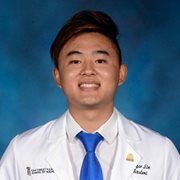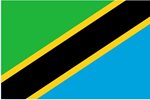Roger Lin
 Roger is a second-year medical student at the University of Maryland School of Medicine. After graduating with a Bachelor’s of Science in Nutrition from University of Maryland College Park, he spent a year working as an ED scribe in West Baltimore, then a year as a mental health case manager in Washington, DC. Roger is highly passionate about mental health and the psychosocial determinants of health in general as it affects patients, healthcare workers and students. Through the Kean fellowship, he is excited to head to Tanzania for the first time to participate in an investigation on the pattern of antimicrobial resistance in Tanzania with the goal of helping start Tanzania's first antimicrobial stewardship program. In his spare time Roger enjoys expressing himself through Salsa, Bachata, HipHop and collecting recipes from the around the world to deconstruct at home.
Roger is a second-year medical student at the University of Maryland School of Medicine. After graduating with a Bachelor’s of Science in Nutrition from University of Maryland College Park, he spent a year working as an ED scribe in West Baltimore, then a year as a mental health case manager in Washington, DC. Roger is highly passionate about mental health and the psychosocial determinants of health in general as it affects patients, healthcare workers and students. Through the Kean fellowship, he is excited to head to Tanzania for the first time to participate in an investigation on the pattern of antimicrobial resistance in Tanzania with the goal of helping start Tanzania's first antimicrobial stewardship program. In his spare time Roger enjoys expressing himself through Salsa, Bachata, HipHop and collecting recipes from the around the world to deconstruct at home.

The First Antimicrobial Stewardship Program in Tanzania: Determining the Degree of Antibiotic Resistance and Bacterial Causes of Infection at Muhimbili National Hospital in Dar es Salaam, Tanzania
6/01/2019 - 7/05/2019
Tanzania
What does the Kean Fellowship mean to you?
The Kean Fellowship provides me the means to gain a truly life-changing experience in international infectious disease research that I otherwise would not be able to pursue. It allows me to learn from the current pioneers and leaders in the field, experiencing what it's like to forage into one the hottest topics of medicine currently, antimicrobial resistance.
What do you anticipate learning?
I anticipate deeply understanding the challenges Tanzania faces in accurate and consistent data collection as well as the availability of technology for research. I also expect learning about how cultural beliefs affect how healthcare is carried out at the hospital level as well as the pharmacy level. I am also very interested in seeing how the extent and types of antimicrobial resistance differs from the U.S.
What interests you about tropical medicine and what problems are you interested in solving?
My passion and professional goals lie in designing and implementing innovative ways to tackle systemic problems. Tropical medicine research allows me to continue with this passion, but on a larger scale. This project gives me practical experience in analyzing a system (in this case antimicrobial administration in at MNH), determining the sources of the problem (which antimicrobials are misused), identifying the consequences (which infections are promoted), and developing realistic methods to address these in a resource-limited setting (innovative thinking). I am also attracted by the focus of our project on resource-limited settings like Tanzania. The lack of high quality data and research in these settings is a major concern for the effectiveness of the local public health system. It is tremendously satisfying to know that our project will unearth novel information about patient care in Tanzania that will allow for informed changes in treatment guidelines in the future.